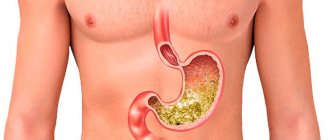The cause of bad breath is not always found in the mouth. Especially when the most common causes, for example, pathology of the oral cavity or stomach, have already been excluded - perhaps the source of the unpleasant odor is located deeper.
It is purulent inflammation that often leads to the formation of a “bad” odor. If it is in the mouth, the cause is usually discovered quickly. On the other hand, in the case of inflammation outside the mouth, additional diagnostics may be required to find the cause of bad breath.
Does inflammation in the sinuses lead to bad breath?
Since the air is exhaled through the nasal cavity, it physiologically communicates with the paranasal sinuses; in the event of their purulent inflammation, an unpleasant odor is mixed with the inhaled portion of air. Sanitation of the oral cavity or treatment of stomach problems will not help in this case, since the source of the odor is outside the oral cavity.
Inflammation in the antrum of the maxillary sinus is caused by recurrent bacterial infections. Quite often, staphylococcus becomes such a “bad-smelling” agent.
Prevention of odor
Hygiene is an important point in preventing oral diseases. Teeth should be brushed twice a day. Circular movements are performed over the entire surface of the crowns. At the same time you need to clean your tongue. Its surface is cleaned with a soft brush. You can purchase a special brush.
If the doctor recommended a paste containing calcium, then you need to strengthen the enamel. Antiseptic agents will reduce bacterial activity. This will improve the condition of the gum tissue. After eating, you should rinse your mouth with clean water. It is important to visit the dentist regularly. Prevention of disease is the best treatment. If the oral cavity is in order, but your breath is not fresh, you need to make an appointment with a therapist. You can get rid of halitosis when the disease that caused it is eliminated.
Features of treatment in this situation.
Brushing your teeth only eliminates the odor for a short time. With chronic inflammation of the paranasal sinuses, bad breath is usually not the only problem. Inflammation of the paranasal sinuses also causes other symptoms, such as pain in the affected sinus area and postnasal drip. Thus, for more effective help, the possibility of surgical treatment of inflamed paranasal sinuses should be considered, if conservative treatment methods are ineffective. If the inflammation is eliminated, bad breath usually goes away on its own.
The main goal in the surgical treatment of chronic sinusitis is to normalize the anatomy of the nasal cavity and restore the aerodynamics of the nasal cavity and paranasal sinuses. Corrective operations in the nasal cavity are performed: septoplasty, vasotomy with lateroposition, bullotomy cf. turbinates. The natural openings of the paranasal sinuses expand, allowing pus and mucus to leak out, and sinus ventilation is restored.
Restoring normal air exchange prevents the resumption of inflammation. In addition, as part of the operation, the affected sinus is washed out. The pus is removed, which usually eliminates the odor immediately. If secondary infection does not occur after surgery and healing proceeds normally, then the symptoms of halitosis disappear completely.
Bad breath: a case for the dentist or ENT specialist?
Depending on where the cause of bad breath is located, the treating specialist is either a dentist or an ENT specialist. Typically, in multidisciplinary clinics, these specialists work in close cooperation, so if the dentist cannot identify the causes of the constantly occurring unpleasant odor from the oral cavity, then you should consult an otolaryngologist.
In addition to inflammation of the antrum of the maxillary sinus or other paranasal sinuses, chronic tonsillitis can cause bad breath. Also, general diseases of internal organs can be a trigger for bad breath, for example, in the gastrointestinal tract.
Causes of putrid breath
What are the causes of putrid breath? An unpleasant taste can be felt in various pathologies.
- When proteins are not broken down properly by anaerobic bacteria that live on the gums and tongue.
- When there is no normal microflora in the body, the activity and number of beneficial microorganisms is limited.
- If the patient has an incorrect diet.
- With reduced immunity.
- When the patient has problems with the respiratory organs.
About these and other provoking factors in more detail.
Diseases of the teeth and oral cavity
Disease of the gum tissue and chewing organs negatively affects the taste in the mouth. Patients complain of constant discomfort in the oral cavity. The symptom appears when the hygiene of the tongue and teeth is not carried out thoroughly. This causes food debris to decompose under the influence of bacteria. Some foods make your breath stale afterward. In addition, an undesirable aroma appears in case of carious lesions of incisors, canines, and molars. Such patients need the services of a dental clinic.
It is important to identify and treat periodontal disease, periodontitis, and gingivitis in a timely manner. Plaque and fossilized deposits smell bad because they contain many pathogenic microorganisms. The source of bad odor is unclean dentures, especially removable ones.
Diseases of the gastrointestinal tract
Pathological putrid odor from the mouth in adults appears due to diseases of the digestive tract.
- Gastritis, peptic ulcers, inflammation of the pancreas and gallbladder greatly interfere with the digestion of food taken and its movement through the gastrointestinal tract.
- Congestion in the digestive tract due to intestinal diseases does not aromatize the breath.
- The reflux of bile and acid into the esophagus causes an unpleasant taste.
- Chronic liver diseases cause problems because liver cells are weak in neutralizing toxic substances.
The cause of bad odor is kidney failure and diabetes. Even fans of strict diets and monotonous, rare meals complain of discomfort.
ENT pathologies
Anomalies of the ear, nose and throat cannot be excluded from the list of diseases. With imperfect immunity, a runny nose often appears, which affects the sinuses and nasal mucosa. With frontal sinusitis, sinusitis, otitis media, breath becomes stale, the temperature may rise, and symptoms of intoxication may appear. Bad breath is negatively affected by pharyngitis, tonsillitis, diphtheria, laryngitis, as well as burns of the mucous tissues of the pharynx.
Disorders of the salivary glands
Timely treatment of caries ensures good health of the masticatory organs. For minor damage to the crowns, therapy will be easier and faster. A systematic visit to the dentist will ensure that carious lesions are detected at an early stage.
Problems with bad breath can occur when your mouth becomes dry. In medicine, this condition is called xerostomia. It is caused by diseases of the salivary glands.
- Saliva does not sufficiently wash the oral cavity. This causes decay processes.
- Dehydration has a negative effect. If there is not enough water, saliva production slows down. Therefore, it is unable to perform its functions and disinfection does not occur. Bacteria multiply quickly, releasing many volatile compounds.
- Oxygen-poor saliva cannot inhibit the proliferation of pathogenic bacteria.
Common triggers
The smell of rot in the mouth can appear even with healthy gums and teeth. It happens:
- When the patient consumes onions, garlic, cabbage.
- With psychological and physical overload.
- When smoking and drinking alcoholic beverages.
- If hormonal levels change dramatically, especially in the fair half of humanity.
- When the patient uses antihistamines, antidepressants, diuretics.
In such cases, there is no need to worry. But when the symptoms do not disappear for a long time, other abnormalities appear, you need to consult a doctor.
Algorithm for patients in case of persistent bad breath.
In this situation, some features of the actions of patients in the absence of oral pathology should be considered.
- If a consultation with a dentist does not reveal inflammation in the oral cavity, a consultation with an ENT doctor is necessary.
- During the initial examination, several chronic diseases of the ENT organs may be identified, which can contribute to unpleasant odor from the oral cavity: tonsillitis, sinusitis, nasal polyps, rhinitis, etc.
- In case of sinusitis and other sinusitis, endoscopic examination of the nasal cavity may be required.
- In addition to general diagnostics, the doctor may prescribe another examination: CT scan, x-ray (panoramic image), etc.
- As a rule, in the presence of a persistent unpleasant odor, conservative therapy is ineffective. Therefore, surgery should be considered as the most optimal solution to this problem - endoscopic sinus surgery.
If you have any questions about the specifics of the treatment or want to get advice, then I am available in WatsApp chat at this number. The addresses of medical institutions in Moscow where I receive appointments are located on the page: “Contacts”.
Sincerely, otorhinolaryngologist surgeon candidate of medical sciences Boklin A.K.
Top 5 Causes of Bad Breath
Frequent communications with other people are an integral part of modern life. While bad breath can cause “forced silence.” How to avoid becoming an introvert against your will? And where to look for the cause of the trouble?
1. Insufficient hygiene and dental diseases
Food debris on teeth and gums provides food for oral bacteria. And the “waste” of such a diet becomes volatile compounds (ammonia, hydrogen sulfide and others), a large concentration of which is felt as an unpleasant odor.
In addition, such conditions contribute to the proliferation of pathogenic flora, which:
- firstly, it disrupts the pH of the oral cavity (due to bacterial waste products) and promotes demineralization of enamel and tooth tissue itself;
- and secondly, it increases the concentration of volatile substances in the oral cavity and contributes to the appearance of an unpleasant odor.
Thus, both improper hygiene and excess bacteria and signs of inflammation in gum disease, even with good hygiene, may be to blame for the appearance of a “problematic” odor.
In the first case, normal hygiene procedures twice a day, as well as rinsing after meals during the day, are sufficient to eliminate the problem. And in the second, the solution obviously requires the participation of a dentist.
Dry oral mucosa
This phenomenon often occurs while taking certain medications and is caused by insufficient saliva production.
In this case, the cleansing properties of saliva practically disappear, which contributes to the “accumulation” of food debris in the oral cavity and their “decomposition”, and also significantly “makes life easier” for bacteria.
Chronic diseases of the respiratory system
Chronic tonsillitis, pharyngitis, and sinusitis are a reliable source of excessive growth of bacteria in the oral cavity. Here we are most often talking about staphylococci and streptococci, which have pronounced pathogenic properties.
An unpleasant odor can also appear with purulent diseases of the bronchi and lungs, as well as with tumors at the stage of destruction. In this case, the smell from the mouth often becomes putrid in nature, and the cough is accompanied by copious sputum production.
Digestive system diseases
“Stomach” odors are often sour (with normal and high acidity) or “rotten” in nature (with low acidity), and appear under the following conditions:
- reflux of stomach contents back into the esophagus (reflux),
- narrowing of the gastric outlet (pyloric stenosis),
- the presence of ulcerative and oncological processes in the stomach or duodenum.
The smell can also be associated with liver damage, and then it has a characteristic “liver” tint.
Severe metabolic disorders
We are talking primarily about diabetes mellitus and its severe complication – ketoacidosis. The smell from the mouth in which case resembles “acetone”, and the condition itself can be fatal.
How to find the reason
1. You can confirm the “microbial” origin of bad breath by inoculating a swab from the throat and nose. The study will not only “show” the quantity and quality of microorganisms, but will also allow you to select an effective antibacterial drug, if necessary.
Culture is also relevant for sputum, if it is separated.
And also, in any case, an examination by a dentist and an ENT doctor is recommended.
2. It is quite difficult to check the condition of the stomach and duodenum using laboratory methods, therefore, if a “gastric” origin of the odor is suspected, a consultation with a gastroenterologist and FGDS is recommended.
3. The liver is one of the most multifunctional organs, so it is not surprising that many people experience its damage at a young age.
You can check the digestive function of the organ using a blood test for liver enzymes (ALT, AST), bilirubin, alkaline phosphatase and gamma-GT, both individually and in the format of the Liver Examination complex. Base".
4. A blood test for glucose levels and glycated hemoglobin (average level over the last 3 months) is “meant” to control the risk of diabetes.









